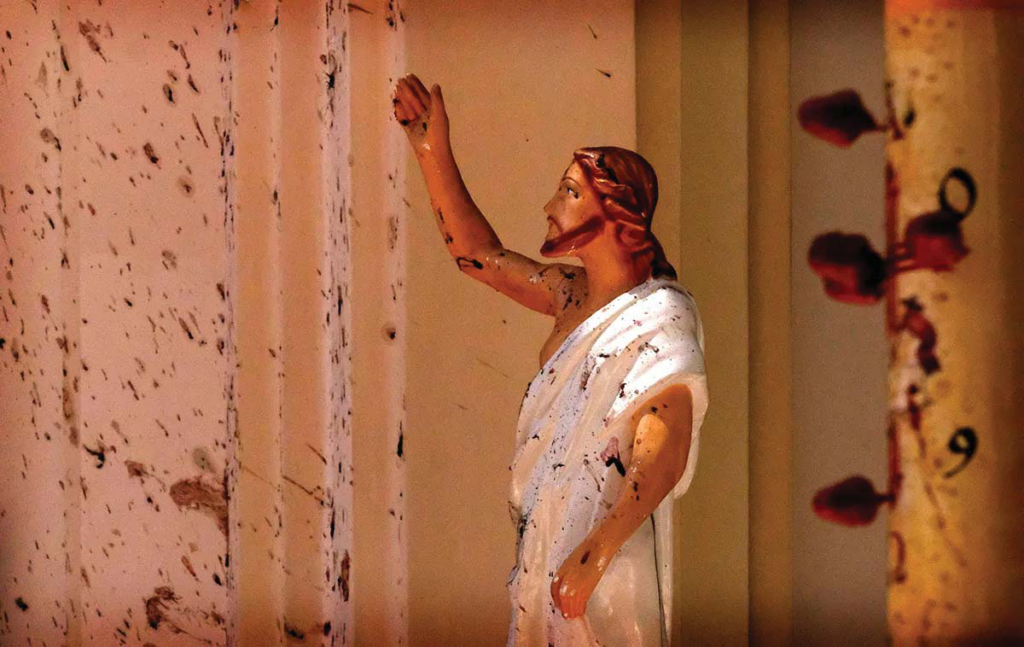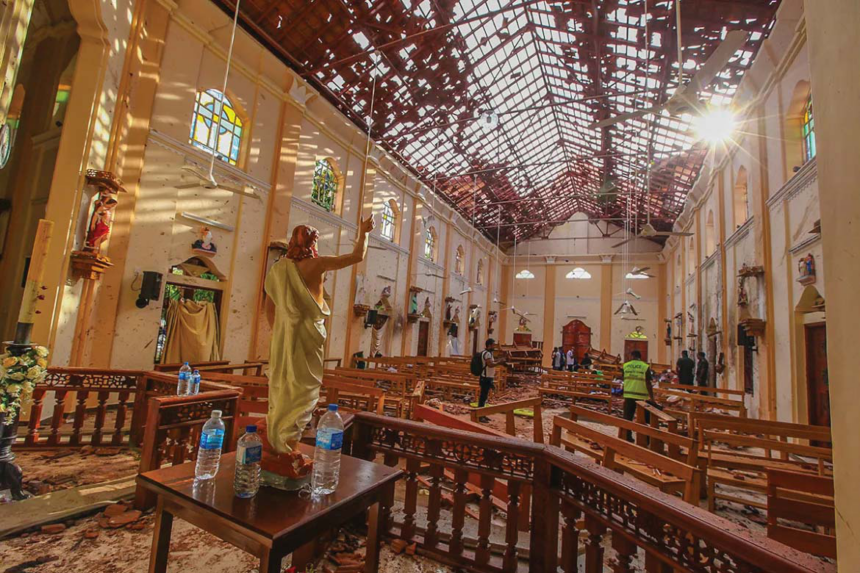On September 5, 2023, the esteemed British broadcasting entity Channel 4 unveiled an investigative documentary titled “Sri Lanka’s Easter Bombings.” Th is film has cast a profound shadow over Sri Lanka’s political landscape. Th e documentary postulates the direct complicity of several Sri Lankan political figures in the harrowing Easter bombings in 2019. Central to these allegations is the implication that the Rajapaksa family masterminded the attacks to orchestrate a political shift in power.
The documentary draws its conclusions from the testimonies of three pivotal informants:

Hanzeer Azad Maulana, a former confidant of Sivanesathurai Chanthirakanthan, also known as Pillaiyaan, the leader of the Tamil Makkal Viduthalaip Puligal (TMVP). Chanthirakanthan currently presides as the
State Minister for Rural Road Transport. Nishantha Silva, an ex-police officer, earned accolades for his rigorous probe into the mysterious death of journalist Lasantha Wickrematunge. His investigation led him
to a comprehensive interview with Mr. Gotabaya Rajapaksa. Given the sensitive nature of the revelations,
a senior Sri Lankan government official chose to provide his insights under the cloak of anonymity, abstaining from any on-screen appearance.
While each informant brought unique insights, Hanzeer Azad Maulana stood out. His damning allegations, especially those levelled against prominent figures like the former president Gotabaya Rajapaksa, Director of State Intelligence Suresh Sallay, and Minister Pillaiyaan, served as the linchpin for the documentary’s narrative. Th ese testimonies accentuated the documentary’s efforts to unravel the complex nexus underpinning the tragic bombings.
Channel 4’s claims largely stem from the statements of Azad Maulana, a former liaison officer to Chandrakanthan, also known as “Pillayan.” Th e latter, once the Chief Minister of the Eastern Province, currently serves as an MP and State Minister.
Azad Maulana, born initially as Muhammad Mihilar Muhammad Hanseer, is a native of the Maruthamunai village situated in the Kalmunai Ampara district. He carries a significant lineage; his father was deeply entrenched in the Tamil Eelam Liberation struggle. Recognized by the nom de guerre ‘Kamalan Thozar,’ Maulana’s father was a seasoned Eelam People’s Revolutionary Liberation Front (EPRLF) militant. He also held the esteemed position of a personal bodyguard for the organization’s paramount leader, Padmanabha. However, tragedy struck on June 19, 1990, when the Liberation Tigers of Tamil Eelam (LTTE) executed a strategic assault in Chennai’s Kodambakkam locale. Th is assault resulted in the unfortunate demise of
several key EPRLF figures, including Kamalan Thozar.
Kamalan Thozar was the father of four children: two daughters and two sons. His eldest son, Hanzeer, born
in 1983, was a mere seven years old when tragedy struck and he lost his father. Following this loss, the family faced tremendous financial hardships. As time passed and the family sought a sense of normalcy, Hanzeer’s mother eventually remarried.
Bearing the weight of personal loss, Azad Maulana harbored deep-seated resentment towards the Liberation Tigers of Tamil Eelam (LTTE), often called the ‘Tigers.’ One of his close relatives echoed this sentiment: “Given that his father was mercilessly killed by the LTTE, it’s only natural for Azad to feel a profound anger towards the ‘Tigers’.”
Azad Maulana demonstrated academic prowess early and studied at the Maruthamunai Shams Madhya Maha Vidyalaya, according to one of his former teachers who commended him for his academic excellence. Pursuing bio-science at the Advanced Level (AL), Maulana achieved commendable scores that secured his enrollment at the Sri Lanka School of Agriculture in Kundasale, Kandy. However, there are contrasting accounts regarding his educational journey aft er that. While some contend that he discontinued his studies aft er a mere year, others assert that he eventually returned to the institution and completed his academic pursuits. During his university years, Hanseer assisted Gunasekaram Shankar (a former EPRLF militant),
an MP for the EPDP at the time.
In a pivotal 2004 schism, the dominant Tamil militant group LTTE experienced an internal revolt. Its Eastern
regional commander, Vinayagamoorthy Muraleetharan, more commonly recognized as Col. Karuna, openly
challenged the authority of LTTE’s paramount leader, Veluppillai Prabhakaran. Th is insurrection resulted in a pronounced division within the LTTE’s organizational framework.
Emerging from this rift , the LTTE Karuna faction, as it was initially termed, shift ed its allegiances to collaborate with the Sri Lankan Government. Th is partnership extended to the nation’s military and intelligence sectors. Empowered by state support, the Karuna faction confronted the LTTE, focusing primarily on the Eastern territories of Sri Lanka. In this new power structure, Karuna’s deputy,
Sivanesathurai Chandrakanthan, known more widely as Pillaiyan, ascended as the commanding figure in Batticaloa.
Parallel to these military developments, a political off shoot took form as the Tamil Eelam Makkal Viduthalaip Puligal (TEMVP). Over time, the party rebranded, adopting Thamil Makkal Viduthalaip Puligal (TMVP). Amidst the backdrop of conflict and shifting allegiances, this political establishment emerged as a central player in the Eastern region’s evolving geopolitical landscape.
By 2006, the Eastern Tigers faction required a suitable representative to support their spokesperson, Uruthira Master, also known as ‘Th ooyavan.’ Recognizing Hanseer’s background and potential advantages (given his personal loss at the hands of the LTTE and his Muslim identity), Pillaiyan entrusted him with the responsibility. Th e hope was that Hanseer’s heritage would cement his loyalty against the LTTE, and his religious identity might offer him protection from the Tigers’ hostilities. Within the organization, he was given the name ‘Suhanthan,’ while externally, he was referred to as ‘Azad Maulana’—both names bestowed upon him by Pillaiyan.
The Eastern Tigers methodically and successfully drove the Northern Tigers, also known as the Vanni Tigers, out of the Eastern Province. By July 11, 2007, the Eastern Province was offi cially declared free from the Vanni Tigers.
Concurrently, the Eastern Tigers initiated the publication of a magazine named ‘Tamil Alai.’ Azad Maulana contributed numerous articles to this magazine, writing under the pseudonym ‘Uttaman.’ During this period, Azad Maulana wedded a woman named ‘Noskia,’ who was born in Colombo and raised in Panadura.
In 2008, the Eastern Tigers pivoted to politics, registering as the Tamil Makkal Viduthalai Pulikal (Tamil Peoples Liberation Tigers) for the Eastern Provincial Council elections on May 10. Th e 37-seat council saw UPFA win 20 seats, UNP 15, and JVP and another Tamil party one each. Contesting under the UPFA’s banner, TMVP’s Sivanesathurai Chandrakanthan, or “Pillaiyan,” garnered an impressive 41,936 votes from Batticaloa, subsequently becoming Chief Minister. Acknowledging Azad Maulana’s loyalty, Pillaiyan appointed him as a coordinator. Their close alliance lasted until 2021.

second marriage
Azad Maulana, already wedded to Noskia, with whom he has two children, deceitfully entered another matrimonial bond. He falsely claimed to have separated from his first wife and went on to marry a woman named Benaseer from his neighbouring village of Sainthamaruthu. Benazir is an English teacher by profession. On 27/09/2021, Maulana’s engagement to Benazir was celebrated with a grand Valima
feast at the Rivera Resort Hotel in Batticaloa. Aft er the meeting, on 28/09/2021, Azad Maulana formally registered his marriage at the ‘Al-Majjitul Huda Bazar Mosque located in Wangamam Village, Amparai District.
Following his second marriage, Azad Maulana’s personal life was plunged into turmoil. His fi rst wife mounted a fierce protest, and the families of both wives confronted him with significant challenges. Both factions sought intervention from Pillaiyan. To shield himself from the ensuing chaos, Azad Maulana appealed to Pillaiyan for protection. However, Pillaiyan maintained a stance of neutrality, suggesting that the matter was beyond his influence, and advised all parties involved to seek legal counsel. He emphasized that Azad Maulana should submit himself to the course of justice.
Stripped of Pillaiyan’s support, Azad Maulana found himself at the mercy of the angered family members of his first wife, who physically assaulted him. Th e police began to closely monitor his activities, intensifying their scrutiny. Further, on 30/01/2022, his second wife lodged a complaint against him (Complaint No. CIB 153/263) over the deceptive marriage at the Sainthamaruthu Police Station. The ensuing events rendered Azad Maulana’s personal life tumultuous and deeply distressing. She further escalated the matter by lodging a complaint with the Ampara CID alleging Azad Maulana had forged government documents.
With no viable alternatives, Azad Maulana boarded a plane bound for India.
Upon reaching Paris from India in June 2022, Azad Maulana travelled to Switzerland for political asylum.
However, his request was declined, leading to his deportation to France, where his asylum plea was similarly turned down.
In light of these events, Azad Maulana stepped into the spotlight, providing an interview to Channel 4 in which he professed knowledge of the intricate details surrounding the Easter bombings. His narrative garnered considerable attention internationally. However, ironically, those acquainted with Maulana locally exhibited skepticism. Many dismissed his testimony relatively lightly, suggesting it was merely a strategy to secure asylum in a European country.



